| Listing 1 - 10 of 87 | << page >> |
Sort by
|
Periodical
Abstract | Keywords | Export | Availability | Bookmark
 Loading...
Loading...Choose an application
- Reference Manager
- EndNote
- RefWorks (Direct export to RefWorks)
moral cognition --- moral judgment --- moral development --- ethics --- morality --- moral competence
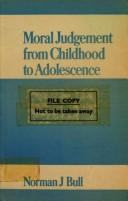
ISBN: 0710066236 Year: 1970 Publisher: London Routledge and Kegan Paul
Abstract | Keywords | Export | Availability | Bookmark
 Loading...
Loading...Choose an application
- Reference Manager
- EndNote
- RefWorks (Direct export to RefWorks)
343.9 --- Judgment (Ethics) --- -Moral judgment --- Ethics --- 343.9 Criminologie --(algemeen) --- Criminologie --(algemeen) --- Case studies --- Moral judgment --- General ethics --- Age group sociology --- Case studies.
Book
Abstract | Keywords | Export | Availability | Bookmark
 Loading...
Loading...Choose an application
- Reference Manager
- EndNote
- RefWorks (Direct export to RefWorks)
In the study of human thinking, two main research questions can be asked: “Descriptive Q: What is human thinking like? Normative Q: What ought human thinking be like?” For decades, these two questions have dominated the field, and the relationship between them generated many a controversy. Empirical normativist approaches regard the answers to these questions as positively correlated – in essence, human thinking is what it ought to be (although what counts as the ‘ought’ standard is moot). In contemporary theories of reasoning and decision making, this is often associated with a Panglossian framework, an adaptationist approach which regards human thinking as a priori rational. In contrast, prescriptive normativism sees the answers to these two questions as negatively correlated. Normative models are still relevant to human thought, but human behaviour deviates from them quite markedly (with the invited conclusion that humans are often irrational). Prescriptive normativism often results in a Meliorist agenda, which sees rationality as amenable to education. Both empirical and prescriptive normativism can be contrasted with a descriptivist framework for psychology of human thinking. Following Hume’s strict divide between the ‘is’ and the ‘ought’, descriptivism regards the descriptive and normative research questions as uncorrelated, or dissociated, with only the former question suitable for psychological study of human behaviour. This basic division carries over to the relation between normative (‘ought’) rationality, based on conforming to normative standards; and instrumental (‘is’) rationality, based on achieving one’s goals. Descriptivist approaches regard the two as dissociated, whereas normativist approaches tend to see them as closely linked, with normative arguments defining and justifying instrumental rationality. This research topic brings together diverse contributions to the continuing debate. Featuring contributions from leading researchers in the field, the e-book covers a wide range of subjects, arranged by six sections: The standard picture: Normativist perspectives In defence of soft normativism Exploring normative models Descriptivist perspectives Evolutionary and ecological accounts Empirical reports With a total of some 24 articles from 55 authors, this comprehensive treatment includes theoretical analyses, meta-theoretical critiques, commentaries, and a range of empirical reports. The contents of the Research Topic should appeal to psychologists, linguists, philosophers and cognitive scientists, with research interests in a wide range of domains, from language, through reasoning, judgment and decision making, and moral judgment, to epistemology and theory of mind, philosophical logic, and meta-ethics.
meliorism --- normative models --- new paradigm --- normativism --- moral judgment --- Bayesianism --- Panglossianism --- rationality --- Is-ought problem --- meliorism --- normative models --- new paradigm --- normativism --- moral judgment --- Bayesianism --- Panglossianism --- rationality --- Is-ought problem
Book
Abstract | Keywords | Export | Availability | Bookmark
 Loading...
Loading...Choose an application
- Reference Manager
- EndNote
- RefWorks (Direct export to RefWorks)
In the study of human thinking, two main research questions can be asked: “Descriptive Q: What is human thinking like? Normative Q: What ought human thinking be like?” For decades, these two questions have dominated the field, and the relationship between them generated many a controversy. Empirical normativist approaches regard the answers to these questions as positively correlated – in essence, human thinking is what it ought to be (although what counts as the ‘ought’ standard is moot). In contemporary theories of reasoning and decision making, this is often associated with a Panglossian framework, an adaptationist approach which regards human thinking as a priori rational. In contrast, prescriptive normativism sees the answers to these two questions as negatively correlated. Normative models are still relevant to human thought, but human behaviour deviates from them quite markedly (with the invited conclusion that humans are often irrational). Prescriptive normativism often results in a Meliorist agenda, which sees rationality as amenable to education. Both empirical and prescriptive normativism can be contrasted with a descriptivist framework for psychology of human thinking. Following Hume’s strict divide between the ‘is’ and the ‘ought’, descriptivism regards the descriptive and normative research questions as uncorrelated, or dissociated, with only the former question suitable for psychological study of human behaviour. This basic division carries over to the relation between normative (‘ought’) rationality, based on conforming to normative standards; and instrumental (‘is’) rationality, based on achieving one’s goals. Descriptivist approaches regard the two as dissociated, whereas normativist approaches tend to see them as closely linked, with normative arguments defining and justifying instrumental rationality. This research topic brings together diverse contributions to the continuing debate. Featuring contributions from leading researchers in the field, the e-book covers a wide range of subjects, arranged by six sections: The standard picture: Normativist perspectives In defence of soft normativism Exploring normative models Descriptivist perspectives Evolutionary and ecological accounts Empirical reports With a total of some 24 articles from 55 authors, this comprehensive treatment includes theoretical analyses, meta-theoretical critiques, commentaries, and a range of empirical reports. The contents of the Research Topic should appeal to psychologists, linguists, philosophers and cognitive scientists, with research interests in a wide range of domains, from language, through reasoning, judgment and decision making, and moral judgment, to epistemology and theory of mind, philosophical logic, and meta-ethics.
meliorism --- normative models --- new paradigm --- normativism --- moral judgment --- Bayesianism --- Panglossianism --- rationality --- Is-ought problem
Book
Abstract | Keywords | Export | Availability | Bookmark
 Loading...
Loading...Choose an application
- Reference Manager
- EndNote
- RefWorks (Direct export to RefWorks)
In the study of human thinking, two main research questions can be asked: “Descriptive Q: What is human thinking like? Normative Q: What ought human thinking be like?” For decades, these two questions have dominated the field, and the relationship between them generated many a controversy. Empirical normativist approaches regard the answers to these questions as positively correlated – in essence, human thinking is what it ought to be (although what counts as the ‘ought’ standard is moot). In contemporary theories of reasoning and decision making, this is often associated with a Panglossian framework, an adaptationist approach which regards human thinking as a priori rational. In contrast, prescriptive normativism sees the answers to these two questions as negatively correlated. Normative models are still relevant to human thought, but human behaviour deviates from them quite markedly (with the invited conclusion that humans are often irrational). Prescriptive normativism often results in a Meliorist agenda, which sees rationality as amenable to education. Both empirical and prescriptive normativism can be contrasted with a descriptivist framework for psychology of human thinking. Following Hume’s strict divide between the ‘is’ and the ‘ought’, descriptivism regards the descriptive and normative research questions as uncorrelated, or dissociated, with only the former question suitable for psychological study of human behaviour. This basic division carries over to the relation between normative (‘ought’) rationality, based on conforming to normative standards; and instrumental (‘is’) rationality, based on achieving one’s goals. Descriptivist approaches regard the two as dissociated, whereas normativist approaches tend to see them as closely linked, with normative arguments defining and justifying instrumental rationality. This research topic brings together diverse contributions to the continuing debate. Featuring contributions from leading researchers in the field, the e-book covers a wide range of subjects, arranged by six sections: The standard picture: Normativist perspectives In defence of soft normativism Exploring normative models Descriptivist perspectives Evolutionary and ecological accounts Empirical reports With a total of some 24 articles from 55 authors, this comprehensive treatment includes theoretical analyses, meta-theoretical critiques, commentaries, and a range of empirical reports. The contents of the Research Topic should appeal to psychologists, linguists, philosophers and cognitive scientists, with research interests in a wide range of domains, from language, through reasoning, judgment and decision making, and moral judgment, to epistemology and theory of mind, philosophical logic, and meta-ethics.
meliorism --- normative models --- new paradigm --- normativism --- moral judgment --- Bayesianism --- Panglossianism --- rationality --- Is-ought problem
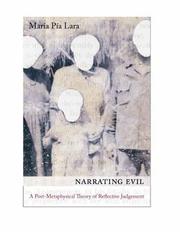
ISBN: 9780231140300 0231140304 0231511663 9780231511667 Year: 2007 Publisher: New York, NY
Abstract | Keywords | Export | Availability | Bookmark
 Loading...
Loading...Choose an application
- Reference Manager
- EndNote
- RefWorks (Direct export to RefWorks)
Conceptions of evil have changed dramatically over time, and though humans continue to commit acts of cruelty against one another, today we possess a clearer, more moral way of analyzing them. In Narrating Evil, María Pía Lara explores what has changed in our understanding of evil, why the transformation matters, and how we can learn from this specific historical development.Drawing on Immanuel Kant's and Hannah Arendt's ideas about reflective judgment, Lara argues that narrative plays a key role in helping societies acknowledge their pasts. Particular stories haunt our consciousness and lead to a kind of examination and dialogue that shape notions of morality. A powerful description of a crime can act as a filter, helping us to draw conclusions about what constitutes a moral wrong, and public debates over these narratives allow us to construct a more accurate picture of historical truth, leading to a better understanding of why such actions are possible.In building her argument, Lara considers Greek tragedies, Shakespeare's depictions of evil, Joseph Conrad's literary metaphors, and movies that portray human cruelty. Turning to such philosophers and writers as Jürgen Habermas, Walter Benjamin, Primo Levi, Giorgio Agamben, and Ariel Dorfman, Lara defines a reflexive relationship between an event, the narrative of the event, and the public reception of the narrative, and she proves that the stories of perpetrators and sufferers are always intertwined.The process of disclosure, debate, and the public fashioning of collective judgment are vital methods through which we make sense not only of new forms of cruelty but of past crimes as well. Narrating Evil describes the steps of this process and why they are a crucial part of our attempt to build a different, more just world.
Good and evil. --- Judgment (Ethics) --- Judgment (Ethics). --- Good and evil --- Moral judgment --- Ethics --- Evil --- Wickedness --- Philosophy --- Polarity --- Religious thought
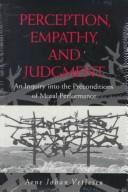
ISBN: 0271010568 9780271010564 0271010126 9780271010120 Year: 1994 Publisher: Philadelphia (Pa.): Pennsylvania State university press
Abstract | Keywords | Export | Availability | Bookmark
 Loading...
Loading...Choose an application
- Reference Manager
- EndNote
- RefWorks (Direct export to RefWorks)
Judgment (Ethics) --- Empathy. --- Empathie. --- Ethiek. --- Ethik. --- Judgment (Ethics). --- Empathy --- Moral judgment --- Ethics --- Attitude (Psychology) --- Caring --- Emotions --- Social psychology --- Sympathy
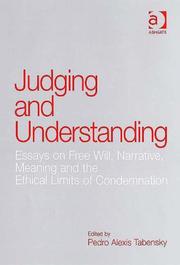
ISBN: 1138356271 1351154796 9780840088128 135115480X 1351154788 128109868X 9786611098681 0754682692 9780754682691 0754653951 9780754653950 9781351154772 9781351154802 9781138621527 Year: 2006 Publisher: Aldershot, England Burlington, VT Ashgate Pub.
Abstract | Keywords | Export | Availability | Bookmark
 Loading...
Loading...Choose an application
- Reference Manager
- EndNote
- RefWorks (Direct export to RefWorks)
"This collection embodies a debate that explores what could be characterised as the tension between judging and understanding. It seems that after a particular threshold of understanding of the basic facts leading to a given moral transgression, the more we understand the context and motives leading to crime, the more likely we are to abstain from harsh retributive judgement. Martha Nussbaum's essay? Equity and Mercy?, included in this collection, is the philosophical starting point of this debate, and Bernhard Schlink's novel The Reader - a novel exploring the tension between judging and understanding, among other things - is used as a case study by most contributors. Some contributors, situated at one end of the spectrum of views represented in this collection, argue for the wholesale elimination of our practices of retribution in the light of the tension between judging and understanding, while contributors on the other side of the spectrum argue that the tension does not actually exist. A whole array of intermediate positions, including Nussbaum's, are represented. This anthology is comprised of nearly all specially commissioned essays bringing together work dealing with the moral, metaphysical, epistemological and phenomenological issues required for properly understanding whether in fact there is a tension between judging and understanding and what the moral and legal implications may be of accepting or rejecting this tension."--Provided by publisher.
Judgment (Ethics) --- Comprehension --- Understanding --- Apperception --- Learning, Psychology of --- Memory --- Moral judgment --- Ethics --- Moral and ethical aspects. --- Philosophical anthropology --- General ethics
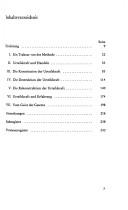
ISBN: 3129104801 Year: 1977 Publisher: Stuttgart Klett
Abstract | Keywords | Export | Availability | Bookmark
 Loading...
Loading...Choose an application
- Reference Manager
- EndNote
- RefWorks (Direct export to RefWorks)
Political science --- Judgment (Ethics) --- Moral judgment --- Ethics --- Administration --- Civil government --- Commonwealth, The --- Government --- Political theory --- Political thought --- Politics --- Science, Political --- Social sciences --- State, The
Book
ISBN: 3319772872 3319772880 Year: 2018 Publisher: Cham : Springer International Publishing : Imprint: Palgrave Macmillan,
Abstract | Keywords | Export | Availability | Bookmark
 Loading...
Loading...Choose an application
- Reference Manager
- EndNote
- RefWorks (Direct export to RefWorks)
This book provides a novel formulation and defence of moral error theory. It also provides a novel solution to the so-called now what question; viz., the question what we should do with our moral thought and talk after moral error theory. The novel formulation of moral error theory uses pragmatic presupposition rather than conceptual entailment to argue that moral judgments carry a non-negotiable commitment to categorical moral reasons. The new answer to the now what question is pragmatic presupposition substitutionism: we should substitute our current moral judgments, which pragmatically presuppose the existence of categorical moral reasons with ‘schmoral’ judgments that pragmatically presuppose the existence of a specific class of prudential reasons. These are prudential reasons that, when we act on them, contribute to the satisfaction of what the author calls ‘the fundamental desire’; namely, the desire to live in a world with mutually beneficial cooperation.
Judgment (Ethics) --- Ethics. --- Moral judgment --- Ethics --- Deontology --- Ethics, Primitive --- Ethology --- Moral philosophy --- Morality --- Morals --- Philosophy, Moral --- Science, Moral --- Philosophy --- Values --- Moral Philosophy.
| Listing 1 - 10 of 87 | << page >> |
Sort by
|

 Search
Search Feedback
Feedback About UniCat
About UniCat  Help
Help News
News